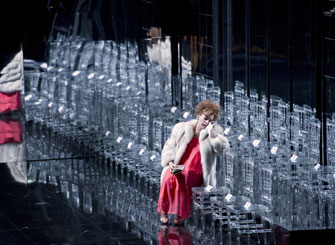For the Love of a God,
Nymph Risks Parody

Marcel Beekman as a forlorn Platée. Photo: Monika Rittershaus
Tucked away behind the Grand Boulevards, the Opéra Comique is one of those Parisian gems that are all too easy to miss. Although the current building dates from the late 19th century, the site has been used as a theater for the Opéra Comique since 1783. It is currently hosting the must-see operatic event of the season, a delicious staging by Robert Carsen of Jean-Philippe Rameau’s 1745 comic opera (termed a “comédie lyrique”) Platée, with Paul Agnew (replacing the indisposed William Christie) conducting the excellent period-instrument orchestra Les Arts Florissants.
The opera was written to celebrate the marriage of the Dauphin (Louis XV’s son) to the Infanta Maria Theresa of Spain. Its main character, Platée, is an ugly water nymph who is duped by Jupiter into thinking he is in love with her. Highly regarded during Rameau’s lifetime, the opera is innovative in a number of ways. Breaking a tradition for tragic opera, it parodies several theatrical and operatic genres, and makes sustained (rather than episodic) use of ballet throughout.
In this production, Carsen (who seems to make a habit of having two productions running concurrently in Paris – his Magic Flute is presently being staged at the Opéra de Paris, Bastille, and last year his productions of Les Contes d’Hoffmann and Capriccio ran at the same time) manages to blend the ancient storyline and 18th-century musical setting with modern concerns by staging a glorious send-up of the fashion world.
The character of Platée is cross-cast, but, unlike the countertenor roles for which Handel is so well known, she is sung by a tenor with a recognizably masculine voice, bringing to the fore the fact that she is primarily a figure of fun. As Carsen explains in the program, Platée may be a kind of fashion victim, vain and ridiculous, but she is also someone who just wants to be admired and loved.
As we are told in the bacchanalian Prologue, however, “neither mortals nor gods” will be spared from satire, and Carsen enters fully into that spirit. Jupiter is dressed as a Karl
,-Marcel-Beekman.jpg)
Today’s fashion world makes an appearance in the 18th-century opera. Photo: Monika RittershauLagerfeld lookalike, and all members of the chorus are made to look like various fashion-world celebrities (I spotted Anna Wintour, John Galliano and Suzy Menkes, with her distinctive “brioche” hairstyle, among many others). The self-regarding nature of the work and of Western society is brought out by the ample use of mirrors in the staging (from a glitzy Parisian restaurant in Act I to the fashion show setting of Act II and the lavish bridal suite in Act III).
Inevitably, the success of this opera depends largely on the tenor singing the role of Platée. It is a part that can too easily be overplayed; the singer needs to tread a fine line between portraying a satirical figure and occasionally arousing the audience’s empathy. Marcel Beekman is perfect in this regard, performing with appropriate panache the character’s repeated squawking motif (Quoi! Quoi!) and yet at times singing with real beauty of tone.
Agnew, who himself has sung the title role on previous occasions, clearly knows the music inside-out and leads Les Arts Florissants with energy and sensitivity. Of the other singing roles, Marc Mauillon as Cithéron, Cyril Auvity as Mercure, Edwin Crossley-Mercer as Jupiter, and Émilie Renard as his jealous wife Junon all perform with aplomb.
Given the comic context of the piece, the character La Folie (Folly) features prominently. Here dressed as a cross between Madonna and Lady Gaga, Simone Kermes makes up for a somewhat insecure middle range with some thrilling high notes and a brilliant sense of theatricality.
Ballet plays a large part throughout the opera, and the choreography by Nicolas Paul is exceptional, with the dancers expressing themselves with extraordinary fluidity and suppleness.
I suspect that it might be difficult to get tickets for this wonderful show, but I wouldn’t rule out selling your grandmother to have the chance to see such an inventive staging, performed by uniformly excellent musicians and dancers.
Opéra Comique: 1, place Boieldieu 75002 Paris. Métro: Richelieu-Drouot. Reservations: 0825 01 01 23 or philippe.pocidalo@opera-comique.com. Tickets: €6-€120. Through March 30, 2014. www.opera-comique.com
Support Paris Update by ordering music and books from Paris Update’s Amazon store at no extra cost. Click on your preferred Amazon location: U.K., France, U.S.
Reader Reaction: Click here to respond to this article (your response may be published on this page and is subject to editing).
© 2013 Paris Update
Favorite